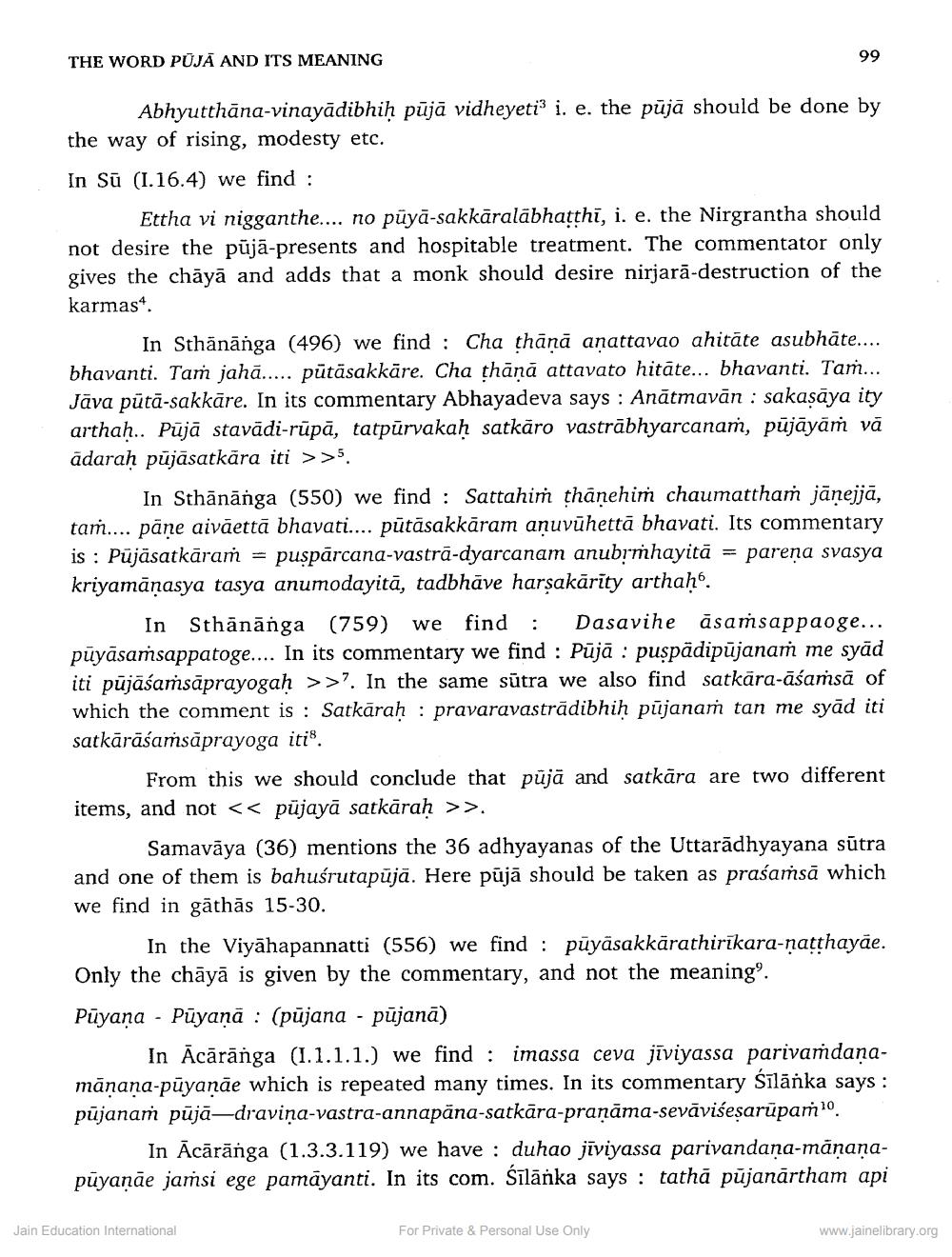________________
THE WORD PŪJĀ AND ITS MEANING
Abhyutthāna-vinayādibhih pūjā vidheyeti' i. e. the pūjā should be done by the way of rising, modesty etc. In Sū (I.16.4) we find :
Ettha vi nigganthe.... no pāyā-sakkāralābhatthi, i. e. the Nirgrantha should not desire the pūjā-presents and hospitable treatment. The commentator only gives the chāyā and adds that a monk should desire nirjarā-destruction of the karmas
In Sthänānga (496) we find : Cha thānā anattavao ahitāte asubhāte.... bhavanti. Tam jahā..... pūtāsakkāre. Cha thāņā attavato hitāte... bhavanti. Tam... Java pūtā-sakkare. In its commentary Abhayadeva says : Anātmavān: sakasaya ity arthaḥ.. Pujā stavādi-rūpā, tatpūrvakaḥ satkāro vastrābhyarcanam, pūjāyāṁ vā ādarah pūjāsatkāra iti >>5.
In Sthānānga (550) we find : Sattahim thanehim chaumattham jānejjā, tam.... pāņe aivāettā bhavati.... pūtāsakkāram aņuvūhettā bhavati. Its commentary is : Pūjāsatkāram = puspārcana-vastrā-dyarcanam anubrmhayitā = parena svasya kriyamānasya tasya anumodayitā, tadbhāve harsakārīty arthaḥ.
In Sthānānga (759) we find : Dasavihe asamsappaoge... pāyāsamsappatoge.... In its commentary we find : Pūjā : puspädipūjanaṁ me syād iti pūjāśaṁsāprayogah >>?. In the same sūtra we also find satkāra-āśaṁsā of which the comment is : Satkāraḥ : pravaravastrādibhiḥ pūjanam tan me syād iti satkārāśaṁsāprayoga itik.
From this we should conclude that püjä and satkāra are two different items, and not << püjayā satkārah >>.
Samavāya (36) mentions the 36 adhyayanas of the Uttarādhyayana sūtra and one of them is bahuśrutapūjā. Here pūjā should be taken as praśaṁsā which we find in gāthās 15-30.
In the Viyāhapannatti (556) we find : pāyāsakkārathirikara-natthayāe. Only the chāyā is given by the commentary, and not the meaning. Pūyaņa - Pūyaņā : (pūjana - pūjanā)
In Ācārānga (1.1.1.1.) we find : imassa ceva jīviyassa parivaṁdanamānana-pūyanāe which is repeated many times. In its commentary Sīlānka says: pūjanaṁ pāja—draviņa-vastra-annapāna-satkāra-pranāma-sevāvišesarūpań".
In Ācārānga (1.3.3.119) we have : duhao jīviyassa parivandana-māņaņapuyanāe jamsi ege pamayanti. In its com. Sīlānka says: tathā pujanartham api
Jain Education International
For Private & Personal Use Only
www.jainelibrary.org




